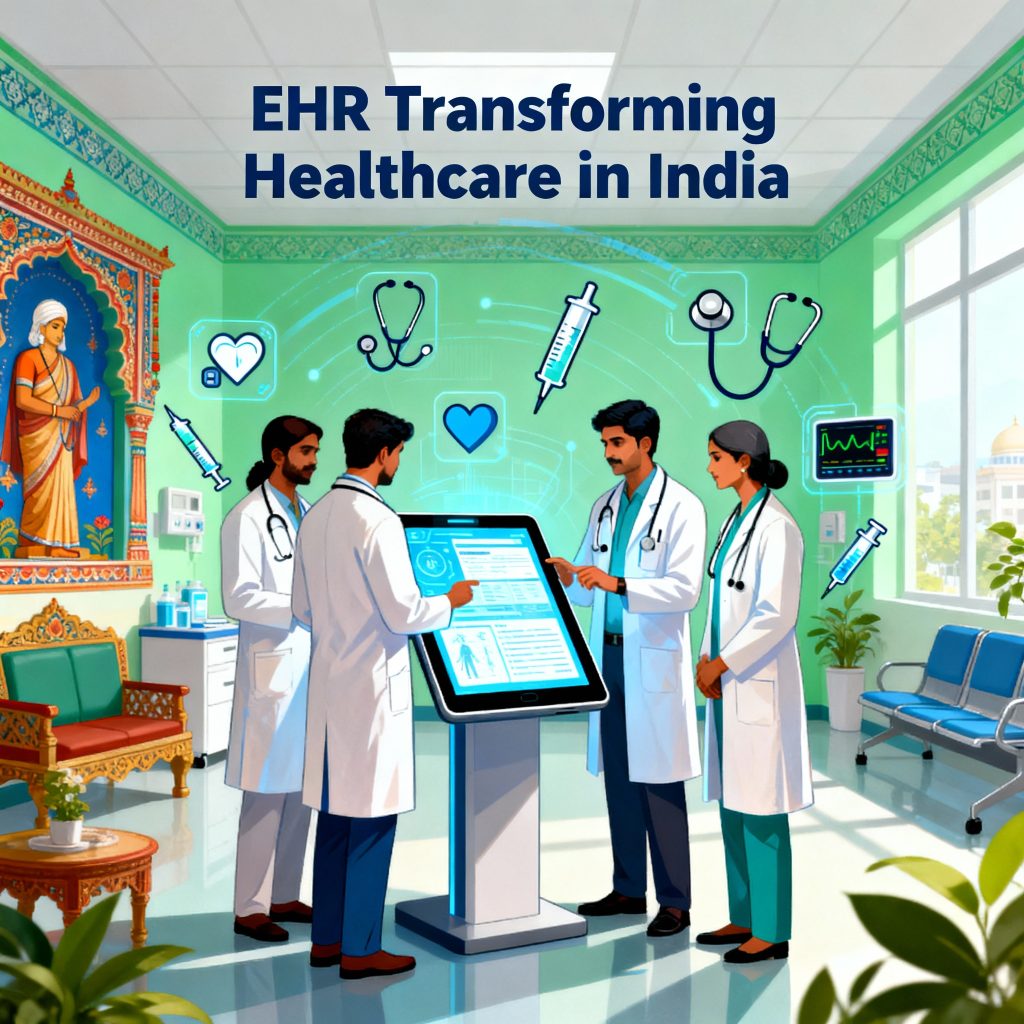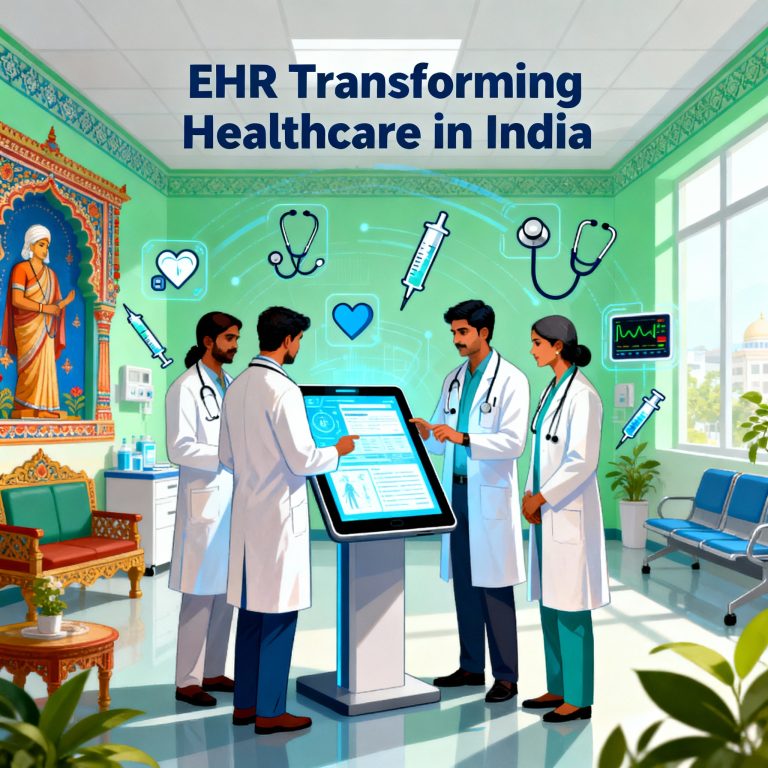In today’s rapidly evolving healthcare landscape, EHR software has become an essential tool for clinics, hospitals, and healthcare providers. Not only does it streamline patient management, but it also enhances clinical efficiency, reduces errors, and improves overall patient outcomes. Moreover, the adoption of EHR software in India is growing at an unprecedented pace, driven by increasing demand for digital healthcare solutions and government initiatives supporting healthcare technology. Consequently, understanding how EMR software complements EHR systems is crucial for healthcare organizations aiming to deliver modern, patient-centric care.
What is EHR Software?
To begin with, EHR software (Electronic Health Record software) is a digital platform that stores, manages, and organizes patient medical information. Unlike traditional paper records, EHR systems allow healthcare professionals to access a patient’s medical history instantly and securely. Additionally, they integrate multiple functionalities, such as appointment scheduling, lab results tracking, and prescription management, thus reducing administrative burdens.
Furthermore, EHR systems are designed to facilitate seamless communication among different healthcare providers. For instance, a primary care physician can share a patient’s medical data with a specialist, thereby improving collaboration and enhancing treatment accuracy. Therefore, investing in reliable EHR software in India has become a strategic priority for healthcare organizations seeking efficiency, accuracy, and patient satisfaction.
The Role of EMR Software in EHR Systems
While EHR and EMR software are often used interchangeably, they serve slightly different purposes. EMR software primarily focuses on the digital documentation of a patient’s medical records within a single clinic or hospital. On the other hand, EHR software is more comprehensive, allowing for data sharing across multiple healthcare providers.
Moreover, integrating EMR software with an EHR system ensures that all patient data is structured, accurate, and easily retrievable. This integration is particularly beneficial for clinics that aim to adopt online EMR software as part of a larger EHR infrastructure. Consequently, patients receive consistent care, and healthcare professionals can make informed decisions quickly.
Key Benefits of EHR Software
Transitioning to EHR software offers numerous advantages for healthcare providers. First and foremost, it improves patient care by providing immediate access to medical histories, test results, and prescriptions. This, in turn, reduces errors and ensures that treatment plans are well-informed and timely.
Additionally, EHR systems enhance workflow efficiency. By digitizing patient records and automating administrative tasks, staff can focus more on patient care rather than paperwork. Moreover, features like appointment reminders, billing integration, and lab result notifications streamline clinic operations and reduce delays.
Security and compliance are also critical benefits of EHR software in India. These systems come equipped with encryption, access control, and audit trails, ensuring that sensitive patient data remains protected. Furthermore, they help clinics comply with local healthcare regulations, which is increasingly important as data privacy laws evolve.
Features of Modern EHR Software
Modern EHR software comes with a variety of features designed to support healthcare organizations efficiently. These include:
- Patient Management – storing demographic information, medical history, allergies, and ongoing treatments.
- Clinical Documentation – enabling physicians to create, update, and share clinical notes digitally.
- Lab and Test Integration – providing real-time access to laboratory results and diagnostic reports.
- Medication Management – tracking prescriptions, potential drug interactions, and refill alerts.
- Billing and Insurance Integration – automating claims and streamlining payment processes.
Moreover, advanced EHR solutions offer mobile access, analytics dashboards, and telemedicine capabilities. As a result, healthcare providers can offer efficient, remote, and data-driven care, which is particularly important in the context of increasing patient demand and digital healthcare adoption.

Why Healthcare Providers in India Are Adopting EHR Software
The adoption of EHR software in India has accelerated significantly in recent years. Firstly, the growing patient population and increasing complexity of healthcare delivery demand digital solutions. Clinics and hospitals are looking for ways to manage large volumes of patient data efficiently.
Secondly, patients themselves are increasingly tech-savvy and expect faster, more accurate, and transparent healthcare services. Therefore, implementing EHR software not only improves operational efficiency but also enhances patient satisfaction.
Thirdly, the Indian government is promoting digital health initiatives, such as the National Digital Health Mission, which encourages healthcare providers to adopt EMR and EHR solutions. Consequently, hospitals and clinics are leveraging these platforms to ensure compliance, improve record accuracy, and support telemedicine initiatives.
Moreover, digital records enable better data analytics and research. By utilizing aggregated patient data, healthcare organizations can identify trends, monitor disease outbreaks, and implement preventive measures effectively. This data-driven approach improves not only individual patient care but also overall public health outcomes.
Challenges and Solutions in Implementing EHR Software
Despite the clear benefits, implementing EHR software is not without challenges. One common issue is resistance from staff who are accustomed to traditional paper records. However, proper training and user-friendly interfaces can alleviate these concerns.
Another challenge is data security. While EHR systems are designed to be secure, breaches can occur if protocols are not strictly followed. Therefore, healthcare organizations must implement robust cybersecurity measures, including encryption, two-factor authentication, and regular audits.
Integration with existing healthcare systems is another potential obstacle. Nevertheless, most modern EMR software and EHR platforms are designed to integrate seamlessly with hospital management systems, lab software, and pharmacy networks. As a result, the benefits of EHR adoption outweigh the initial implementation challenges when planned carefully.
The Future of Healthcare in India with EHR Software
Looking forward, EHR software will continue to revolutionize healthcare delivery. Artificial intelligence and machine learning are being integrated into EHR systems to provide predictive analytics, early diagnosis, and personalized treatment recommendations. Consequently, healthcare providers can offer proactive, precise, and efficient care.
Telemedicine also benefits immensely from EHR adoption. Physicians can access patient records instantly during virtual consultations, enabling effective remote care. Furthermore, interoperability between EHR systems ensures seamless data sharing across hospitals, clinics, and labs, thereby improving continuity of care.
Finally, as healthcare organizations increasingly focus on population health management, EHR software in India will play a pivotal role. By analyzing aggregated patient data, clinics and hospitals can implement preventive strategies, monitor chronic conditions, and optimize resource allocation. Thus, EHR adoption is not only a technological upgrade but also a strategic step toward better public health management.
Conclusion: Healthcare in India
In conclusion, EHR software is transforming the healthcare industry by enabling efficient, accurate, and patient-centered care. From improving workflow efficiency to enhancing patient safety, EHR systems provide comprehensive solutions for modern healthcare challenges.
Moreover, the adoption of EHR software in India reflects the growing importance of digital healthcare solutions in meeting patient expectations and regulatory requirements.Integrating EMR software with EHR platforms ensures that all patient data is structured, secure, and easily accessible, ultimately supporting better decision-making and improving clinical outcomes.
Therefore, healthcare providers who invest in EHR solutions today are positioning themselves for a more efficient, innovative, and patient-focused future.

